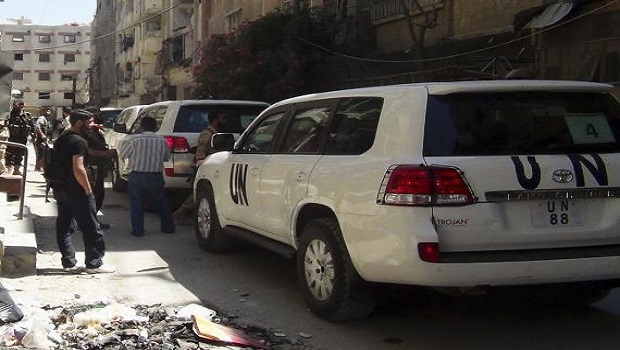
Free Syrian Army fighters and residents gather around a convoy of U.N. vehicles carrying a team of United Nations chemical weapons experts at one of the sites of an alleged chemical weapons attack in Damascus’ suburbs of Zamalka August 28, 2013. (Reuters/Hadi Almonajed
London and Beirut, Asharq Al-Awsat—Britain is set to table a draft resolution at the UN Security Council later today seeking approval for military action against Syria.
Speaking via Twitter, Prime Minister David Cameron announced that “Britain has drafted a resolution condemning the chemical weapons attack by Assad and authorizing necessary measures to protect civilians.”
“We’ve always said we want the UN Security Council to live up to its responsibilities on Syria. Today they have an opportunity to do that,” he added.
The British Prime Minister’s statement came one day after US Defense Secretary Chuck Hagel said the US military was ready if President Obama issued orders for an attack on Syrian targets. The attack is expected as a response to alleged use of chemical weapons by the Syrian government in Damascus on Wednesday, August 21.
David Cameron on Tuesday recalled parliament which is set to discuss the Syrian issue on Thursday. He said, “Any response should be legal and proportionate, and designed to deter the use of chemical weapons.”
Since news of the chemical attack was revealed last Wednesday, a US-led military action has been increasingly expected, although UN approval of such an attack is not anticipated due to Russian and Chinese objections.
Earlier today, a team of UN weapons inspectors resumed work probing the suspected chemical weapons attack following a 24-hour delay over security concerns. UN Secretary-General Ban Ki-moon stressed that the UN team investigating the alleged chemical attack must be given time to establish the facts. He said that the team has already “gathered valuable samples and interviewed victims and witnesses.” The UN Secretary-General called for a diplomatic solution to the Syrian conflict, saying that the international body’s permanent members—who are bitterly divided over Syria—must not go “missing in action” as the Syrian crisis deepens.
For his part, international envoy Lakhdar Brahimi stressed that any military action taken in response to alleged chemical weapons attacks in Syria must be approved by the UN Security Council.
Speaking during a press conference in Geneva, he said: “I think international law is clear on this. International law says that military action must be taken after a decision by the Security Council. That is what international law says.”
Brahimi did acknowledge that “some kind of substance” had been used near Damascus on August 21, killing hundreds of people, however he echoed Ban Ki-moon’s call for the international community to await for official investigations into the incident to conclude.
Daniel Levy, director of the Middle East and North Africa Program at the European Council for Foreign Relations said the use of chemical weapons has forced Washington to take action. He told Asharq Al-Awsat: “There is a need for serious diplomatic effort, but the latest developments do not point to that being possible, especially given that Iran and Russia will harden their stance after a military strike, to save face.”
He added that “working for a real diplomatic solution in Syria needs a calming down of the situation, not an escalation.”
Meanwhile, an official source in Washington, speaking on the condition of anonymity, informed Asharq Al-Awsat: “No decision has yet been made on military action, and when that happens, it will not include regime change.”
A European diplomat, also speaking to Asharq Al-Awsat on the condition of anonymity, stressed that “if we allowed the use of chemical weapons once without holding someone accountable, it will happen again, therefore, the strategic reason is to deter the Syrian regime and others from using chemical weapons.”
Saudi Foreign Minister Prince Saud Al-Faisal on Tuesday said it was important that “an international stance is taken against the arrogance of the Syrian government, who targets its people and commits heinous massacres…especially after using internationally banned chemical weapons in Damascus.”
“The situation requires a stern and serious international stance to put an end to the human tragedy of the Syrian people especially that the Syrian government has lost its Arab identity and is no longer part of the Syrian culture which was always at the heart of Arab nationalism,” he added.
Thair Abbas also contributed to reporting
